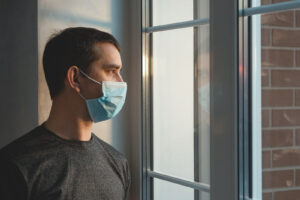
What happens when an unthinkable COVID-19 pandemic collides with a raging opioid epidemic? No, this isn’t the start of a joke. Rather, it’s a serious question that addiction experts have been asking since COVID-19 took the country by storm earlier this year.
Those struggling with opioid addiction are certainly at a higher risk of contracting the virus due to weakened immune systems. But has COVID-19 increased the rates of relapse and overdose? Could the pandemic trigger opioid addiction in previously healthy people? Here’s what we know so far about how COVID-19 is affecting the opioid crisis.
The Impacts of COVID-19 on the Opioid Epidemic
Opioid Addiction Increases the Risk of COVID-19
Whether it’s prescription painkillers or illicit opioids like heroin, opioid addiction compromises the immune system. The innate immune system is meant to be the first line of defense against illnesses. However, factors like decreased sleep and nutrition (consequences of addiction) and needle sharing weaken the innate immune system and make it easier for bacteria and viruses to enter the body.
Since the body lacks proper sleep, hydration and nutrients to keep itself healthy, the adaptive immune system is also compromised. This part of the immune system is needed to fight off viruses that manage to enter the body. Opioid addiction lowers the adaptive immune system’s ability to create new cells, leaving the body much more vulnerable to COVID-19.
COVID-19 May be Increasing Overdose Rates
While it’s still too early for definitive data on how COVID-19 is impacting opioid overdose rates, current reports are sending up red flags. On September 8, the American Medical Association reported that 40 states have seen an increase in opioid-related deaths. Many of these fatal overdoses have come from illicitly manufactured fentanyl and other fentanyl products.
Part of this may be due to how the pandemic has impacted the drug supply chains. People struggling with opioid addiction may now be turning to new drug dealers or purchasing new drugs without knowing their potency. Riskier drug use combined with increased isolation can lead to people overdosing alone with no one available to call 911, which may be contributing to the rise of overdose mortalities.
Social Distancing Has Increased Mental Health Challenges
Job loss, social distancing from loved ones and economic downturn from the COVID-19 pandemic have led to increased grief, isolation, stress and symptoms of mental health conditions.
In fact, a recent report by the Centers for Disease Control and Prevention showed that anxiety disorder and depressive disorder symptoms increased significantly from April to June 2020 compared to the same period last year. In the same study, 13.3 percent of respondents admitted that they had started or increased their substance use to try to cope with the stress and mental health symptoms caused by COVID-19.
These results suggest the pandemic has increased the number of dual diagnosis disorders in the United States, as people are struggling to maintain their old routines and no longer have access to healthier means of managing stress and anxiety.
Not only is this dangerous to those in recovery who rely on routine and in-person support meetings to stay sober, but this also puts people with genetic predispositions at risk of developing an opioid addiction.
Recover Safely from Opioid Addiction at The Raleigh House
Despite the COVID-19 pandemic, there is still a lot of hope because of addiction treatment centers like The Raleigh House. Instead of being isolated at home, you or your loved one can come to the Raleigh House to receive evidence-based and holistic opioid addiction treatment. Between our “east to west” approach that incorporates evidence-based and experiential therapies to our private and clean lodge-setting just outside of Denver, you or your loved one can achieve long-lasting sobriety and be safe from the virus.
If you or your loved one is ready to find lasting recovery from opioid addiction, don’t wait another minute. Contact our admissions team today to learn how to get started.
FAQs About Opioid Addiction
What are the 3 Opioid Addiction Stats?
What are the Dangers of Combining Opioids & Sedatives?
What is the Cost of the Opioid Epidemic?
What are the Impacts of COVID-19 on the Opioid Epidemic?
What Is the Difference Between Opioids and Opiates?
What are the Pros and Cons of Using Marijuana to Quit Opioid Drugs?
Can Medical Marijuana be Used as an Alternative to Opioids?
Why Construction Workers are at Higher Risk of Opioid Addiction?
How Opioids Depress Productivity & Our Workforce?
What’s New in the Opioid Epidemic?
How the Opioid Epidemic is Affecting Millennials?
How Opioids Can Affect Your Gut Health?
What are The Risks of Opioid Use and HIV?
What are the Signs and Symptoms of Opioid Withdrawal?
How to Help Babies of Recovering Addicts?
What Emerging Meth Crisis Has to Do with Opioid Users?
What is the Role of Family in Recovering from Opioid Addiction?
What are the Opioid Prescription Statistics?
What is the Pandemic on Opioid Addiction?
Can Medical Marijuana Reduce Opioid Use?
What are the statistics on the Current Opioid Epidemic?
How Opioid Use Increases HIV Risk
